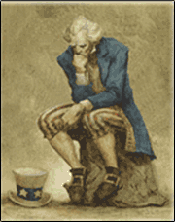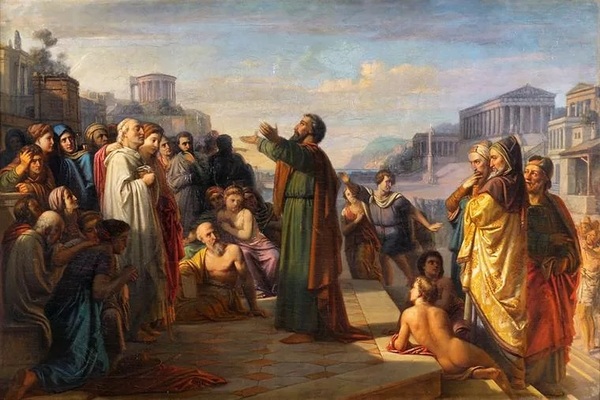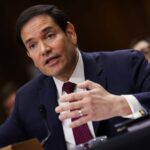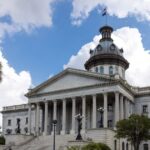
–>
April 16, 2023
We have all become acquainted with the strident, aggressive, and violent tactics of the woke. Speakers are silenced when they go to college campuses. Blog writers are canceled from their platforms or fired from their jobs. Investors are threatened. Sensible debate is shouted down. Peaceful protesters are physically assaulted. In today’s world, those tactics intimidate and frighten many.
‘); googletag.cmd.push(function () { googletag.display(‘div-gpt-ad-1609268089992-0’); }); }
In the early church, Christian leaders faced similar opposition, but not from woke groups. Instead, it came from existing religious groups who could not accept the radical new beliefs of Christianity. When early Christian leaders face this opposition, they typically did so with determination and courage. Sometimes they faced the crowd. Sometimes they realized they had to escape to another town. But they did not waiver from spreading the Gospel, even though they were risking their lives almost everywhere they went.
You can find practically every woke strongarm tactic from today’s world reflected in the book of Acts:
Censorship
‘); googletag.cmd.push(function () { googletag.display(‘div-gpt-ad-1609270365559-0’); }); }
In Jerusalem, the ruling Sadducees told the apostles that they simply could not teach about Jesus:
“We gave you strict orders not to teach in this name.” Acts 5:28)
The apostles simply decided to ignore that instruction and continued to spread the Word:
“We must obey God rather than men!… The apostles left the Sanhedrin, rejoicing because they had been counted worthy of suffering disgrace for the Name. Day after day, in the temple courts and from house to house, they never stopped teaching and proclaiming the good news that Jesus is the Christ.” (Acts 5:41-42)
Creating Lies
In order to counter the teaching of the apostles, their opponents manufactured lies:
‘); googletag.cmd.push(function () { googletag.display(‘div-gpt-ad-1609268078422-0’); }); } if (publir_show_ads) { document.write(“
“Then they secretly persuaded some men to say, “We have heard Stephen speak words of blasphemy against Moses and against God.” (Acts 6:11)
These lies led to Stephen being brought before a court. Instead of cowering, Stephen made a strong defense of the faith. When the crowd rushed him and stoned him, he faced it nobly.
Noise
We see this noise tactic in abundance when the idol-worshippers of Ephesus were afraid that Paul’s message would reduce worship of their god Artemis, so
“… they all shouted in unison for about two hours, ‘Great is Artemis of the Ephesians’.” (Acts 19:34)
Paul simply endured the crowd’s noise and was pardoned by the city authorities.
Ignoring Reason
Throughout Acts, Paul went among both Jews and Gentiles, debating the truth of the Gospel. With Jews, Paul reasoned from the Scriptures that Jesus is the Messiah. With the Gentiles, Paul reasoned with pagans about the greatest of all Gods: Jesus. After doing this in Jerusalem:
“The crowd listened to Paul until he said this. Then they raised their voices and shouted, “Rid the earth of him! He’s not fit to live!” (Acts 22:22)
Paul later defended himself against his accusers.
Creating a Mob
 Paul’s opponents sometimes created mobs, such as when he went to Thessalonica. Paul was reasoning with others in the synagogue (as he did everywhere), converting some to Christianity. As a result, his opponents:
Paul’s opponents sometimes created mobs, such as when he went to Thessalonica. Paul was reasoning with others in the synagogue (as he did everywhere), converting some to Christianity. As a result, his opponents:
“…were jealous; so they rounded up some bad characters from the marketplace, formed a mob and started a riot in the city.” (Acts 17:5)
Paul decided to leave town and went to Berea where he continued to proclaim the Gospel.
Bringing in Agitators from Out of Town
After the turmoil in Thessalonica, Paul went to Berea where he was well-received by the populace. Once the Jews in Thessalonica heard that Paul had gone to Berea, they went there too and stirred up opposition there.
“When the Jews in Thessalonica learned that Paul was preaching the word of God at Berea, they went there too, agitating the crowds and stirring them up.” (Acts 17:13)
Interestingly enough, Paul had actually been one of those who previously had gone from town to town to persecute Christians until he was overwhelmed by a vision of Jesus.
Throwing People in Jail in Spite of Innocence
Often, Paul would be thrown into prison, even though he had committed no crime. One especially egregious example occurred when Jewish leaders stirred up a crowd to attack Paul.
“Seizing Paul, they dragged him from the temple, and immediately the gates were shut. While they were trying to kill him, news reached the commander of the Roman troops that the whole city of Jerusalem was in an uproar. He at once took officers and soldiers and ran down to the crowd. When the rioters saw the commander and his soldiers, they stopped beating Paul. The commander came up and arrested him and ordered him to be bound with two chains.” (Acts 21:30-33)
Paul had done nothing except be on the receiving end of a mob’s wrath. Nevertheless, he was arrested. Unshaken, Paul defended himself before the same crowd.
The Key Difference
The power politics at play by today’s left is not new. And we can see that it’s just another version of what Christians had to face in the early Church.
But there’s a major difference.
The violent agitation and opposition in the book of Acts was directed toward Christian religious leaders – apostles, ministers, and pastors. That opposition came against them because they tried to engage the culture in public and change it.
Today’s Christian pastors – with a few notable exceptions – are not the ones facing agitators, protestors, and mobs. Instead, it’s Christians in extra-church organizations who are standing up, speaking up, and facing woke wrath. It’s the leaders of Students For Life, Alliance Defending Freedom, and others who are giving speeches on college campuses and other public places only to endure shouting protesters.
Most Christian pastors don’t speak out. Rarely do Christian leaders in the Church publicly speak out against abortion or LGBT lifestyles, or in favor of religious freedom and parental rights. Those few who do speak up typically only do so in the safety of their church building or in a statement of faith. Rarely do pastors speak out publicly. Let’s pray that our pastors speak up before it’s too late.
Image: Public Domain
<!– if(page_width_onload <= 479) { document.write("
“); googletag.cmd.push(function() { googletag.display(‘div-gpt-ad-1345489840937-4’); }); } –> If you experience technical problems, please write to [email protected]
FOLLOW US ON
<!–
–>
<!– _qoptions={ qacct:”p-9bKF-NgTuSFM6″ }; ![]() –> <!—-> <!– var addthis_share = { email_template: “new_template” } –>
–> <!—-> <!– var addthis_share = { email_template: “new_template” } –>





